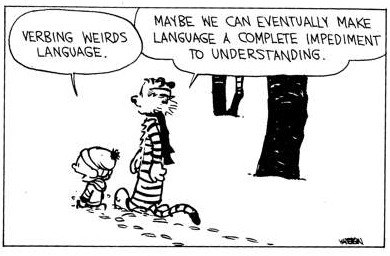Editor’s Note: To my shame, I got only 5/10 on the quiz. Leave your (higher, naturally) score in the comments.
Stan Carey in Sentence First:
 New words enter English in a variety of ways. They may be imported (import); compounded (download); clipped (totes); affixed (globalisation), acronymised (radar); blended (snowmageddon); back-formed (donate); reduplicated (mishmash); coined (blurb); or formed from onomatopoeia (cuckoo), proper nouns (algorithm), folk etymology (shamefaced), or semantic shift (nice, starve).
New words enter English in a variety of ways. They may be imported (import); compounded (download); clipped (totes); affixed (globalisation), acronymised (radar); blended (snowmageddon); back-formed (donate); reduplicated (mishmash); coined (blurb); or formed from onomatopoeia (cuckoo), proper nouns (algorithm), folk etymology (shamefaced), or semantic shift (nice, starve).
Another important source is when a word in one grammatical class is used in another: this is called functional shift, because the word shifts function. A noun becomes an adjective, a verb becomes a noun, and so on. It’s also called conversion and zero derivation – because a new word is derived without any inflection or affixation.
Linguistic conservatives often object to the process. At every Olympic games, for example, people complain about medal being verbed, blithely unaware that the usage dates to at least 1860, when W. M. Thackeray wrote, ‘Irving went home medalled by the king’.
More here.
